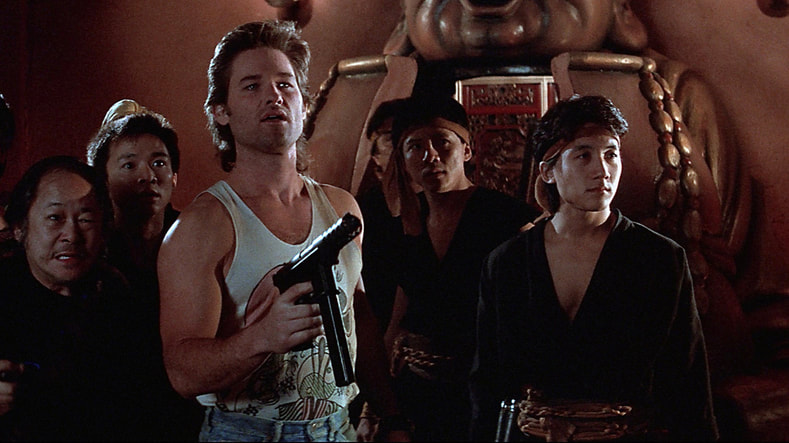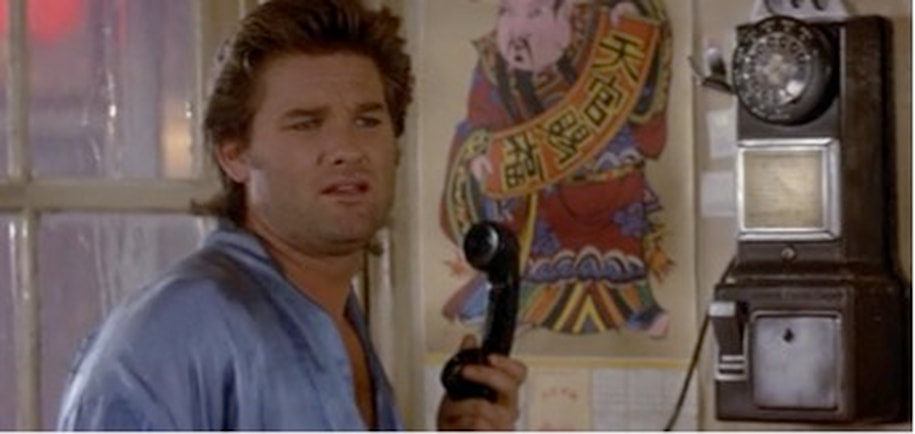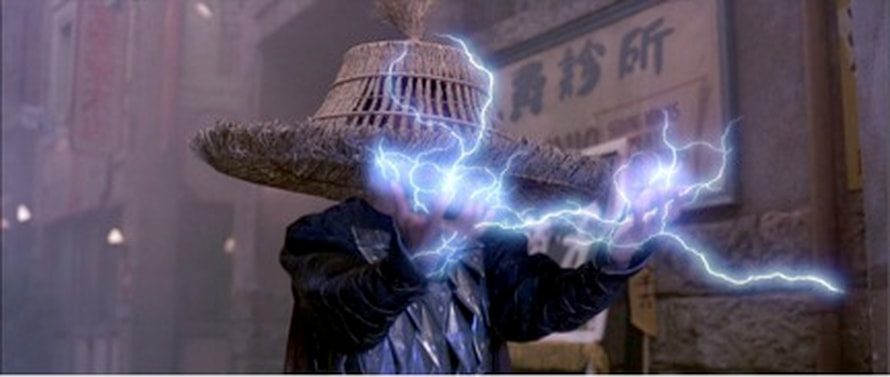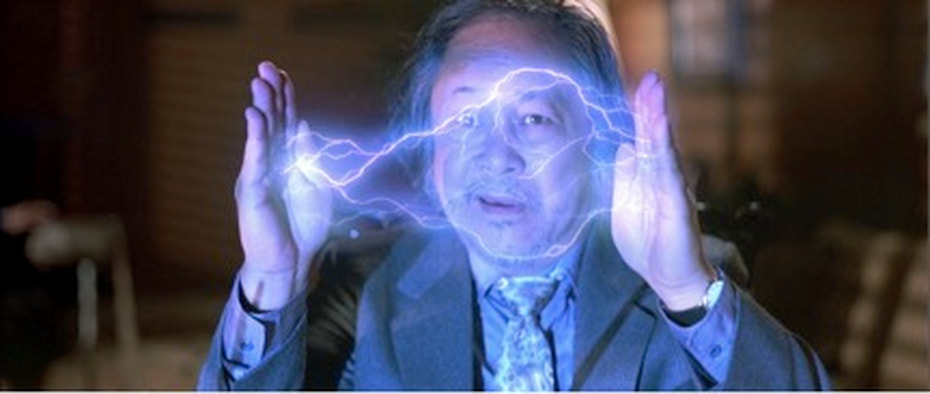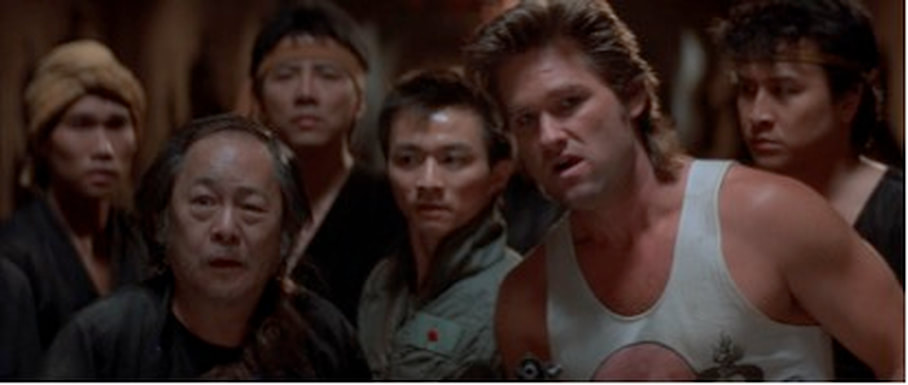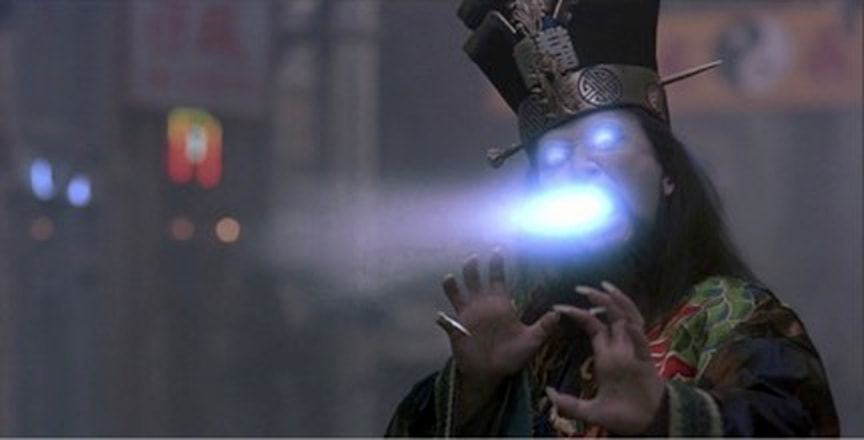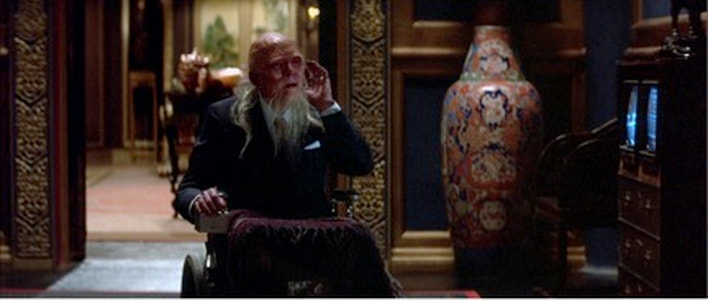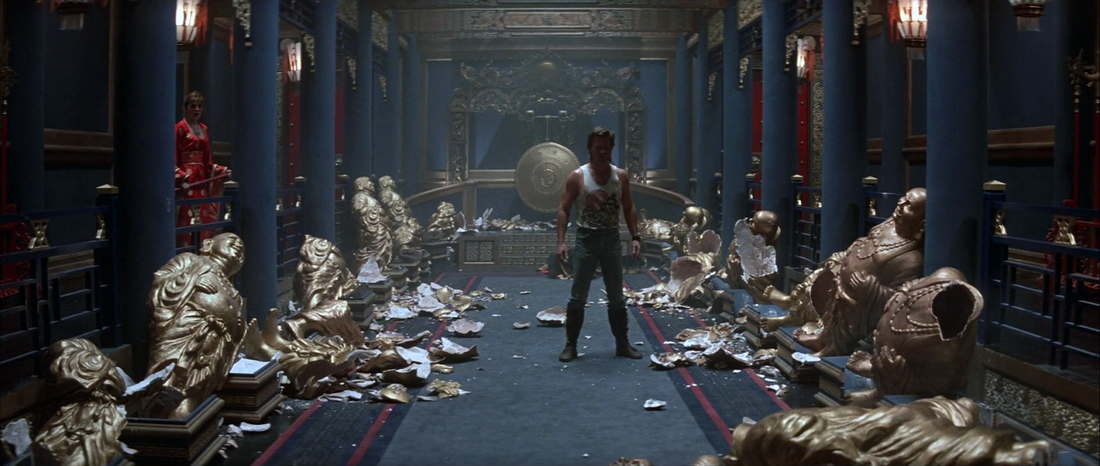"You are not brought upon this world to get it"--Orientalism and Big Trouble in Little China's Self-Awareness
by David Wingert
“China is here, Mr. Burton.” That is the line spoken to a young Kurt Russell, wearing an eighties mullet and an elegant Chinese robe while his trucker clothes hang to dry in a small apartment in Chinatown, San Francisco. His character, Jack Burton, had just followed his Chinese friend Wang Chi (Dennis Dun) in pursuit of Miao Yin (Suzee Pai), Wang’s fiancé who had been abducted by a Chinatown gang called the Lords of Death. In doing so, the two friends stumbled upon a street fight between the Chang Sing and Wing Kong that’s quickly brought to an end by David Lo Pan (James Hong), a mystical ghost trapped in this world with his goons "The Three Storms." If this is at all confusing, it’s okay; poor Jack Burton is more confused than anyone—and this last statement accurately sums up John Carpenter’s bizarre 1986 action/adventure-comedy Big Trouble in Little China. The film’s title is the best way to describe such a hodgepodge of different ideas and concepts jammed into one journey.
The story follows Jack and Wang in their quest to rescue Miao Yin from a Chinatown underworld that begins bizarre and ends with the impossibly outlandish. Every turn the audience takes with Jack brings a new outrageous spectacle all while claiming to be rooted in some skimmed over Chinese belief/legend justifying what is being seen. Chinese culture is ultimately reduced to nothing but cheap B-movie gimmicks that understandably bothered many people who saw the film. Despite this negative reception by some, however, one of Carpenter’s only regrets was that he could not have it take place in the old West. This hints at an interesting idea: Big Trouble plays on Orientalism and what a Westerner might perceive the East as, but Carpenter wanted to give it a feel of a Western—and what is a Western, gun-slinging film but a highly exaggerated misrepresentation of the old West? A Western becomes its own idea independent of the real thing—a genre or tradition of thought. “Therefore as much as the West itself, the Orient is an idea that has a history and a tradition of thought, imagery and vocabulary,” says Edward Said in his book Orientalism, “that have given it reality and presence in and for the West” (5). This brings us back, then, to the statement “China is here.” Big Trouble in Little China is a self-reflexive film on the friction caused by Orientalism in a Western society. It questions how much Orientalism can actually teach the all-American Westerner, Jack Burton, who replies to the earlier statement with “What does that mean? ‘China is here’? I don’t even know what the hell that means!”
Despite the premise dripping in sci-fi fantasy, Big Trouble always keeps a foot submerged in reality. This is in thanks fully to Kurt Russel’s character Jack Burton. Jack enters the film in the "Pork Chop Express," his self-ordained name for his massive delivery truck as it blazes through little street corners of Chinatown. It quickly becomes apparent that Jack is that one American everyone watching seems to know. He thinks highly of himself, has more ex-wives than he can count and has a convenient fast-food religious outlook on life. He doesn’t claim to know everything but then again he only does what he knows. As he definitively states in between bites of hoagie, “I never drive faster than I can see; besides that it’s all in the reflexes.” However, despite his shallowness, Jack quickly becomes the most normal aspect in Big Trouble, and the audience is forced to see this bizarrely fantastic underbelly of Chinatown through Jack's eyes. Every other line he says is a question. “Where are we?” “Who are you?” “What is that?” He is an outsider experiencing everything for the first time, and it frustrates him because he wants to help. “I’m a pretty reasonable guy,” he exclaims at one point “but I’ve just experienced some very unreasonable things.” He, like the audience, is a victim of misunderstanding the culture to which he is being exposed.
The story follows Jack and Wang in their quest to rescue Miao Yin from a Chinatown underworld that begins bizarre and ends with the impossibly outlandish. Every turn the audience takes with Jack brings a new outrageous spectacle all while claiming to be rooted in some skimmed over Chinese belief/legend justifying what is being seen. Chinese culture is ultimately reduced to nothing but cheap B-movie gimmicks that understandably bothered many people who saw the film. Despite this negative reception by some, however, one of Carpenter’s only regrets was that he could not have it take place in the old West. This hints at an interesting idea: Big Trouble plays on Orientalism and what a Westerner might perceive the East as, but Carpenter wanted to give it a feel of a Western—and what is a Western, gun-slinging film but a highly exaggerated misrepresentation of the old West? A Western becomes its own idea independent of the real thing—a genre or tradition of thought. “Therefore as much as the West itself, the Orient is an idea that has a history and a tradition of thought, imagery and vocabulary,” says Edward Said in his book Orientalism, “that have given it reality and presence in and for the West” (5). This brings us back, then, to the statement “China is here.” Big Trouble in Little China is a self-reflexive film on the friction caused by Orientalism in a Western society. It questions how much Orientalism can actually teach the all-American Westerner, Jack Burton, who replies to the earlier statement with “What does that mean? ‘China is here’? I don’t even know what the hell that means!”
Despite the premise dripping in sci-fi fantasy, Big Trouble always keeps a foot submerged in reality. This is in thanks fully to Kurt Russel’s character Jack Burton. Jack enters the film in the "Pork Chop Express," his self-ordained name for his massive delivery truck as it blazes through little street corners of Chinatown. It quickly becomes apparent that Jack is that one American everyone watching seems to know. He thinks highly of himself, has more ex-wives than he can count and has a convenient fast-food religious outlook on life. He doesn’t claim to know everything but then again he only does what he knows. As he definitively states in between bites of hoagie, “I never drive faster than I can see; besides that it’s all in the reflexes.” However, despite his shallowness, Jack quickly becomes the most normal aspect in Big Trouble, and the audience is forced to see this bizarrely fantastic underbelly of Chinatown through Jack's eyes. Every other line he says is a question. “Where are we?” “Who are you?” “What is that?” He is an outsider experiencing everything for the first time, and it frustrates him because he wants to help. “I’m a pretty reasonable guy,” he exclaims at one point “but I’ve just experienced some very unreasonable things.” He, like the audience, is a victim of misunderstanding the culture to which he is being exposed.
Jack Burton (Kurt Russell) in the midst of one of his many questions.
What culture, though? Any Chinese culture Big Trouble might have been based off of is immediately shattered once The Three Storms start flying and David Lo Pan shoots light out of his mouth. Even a reporter in the film, who is trying to understand what is going on, all but gives up saying, “I must be so monumentally naïve!” At one point she is imprisoned by the Lords of Death and can only write poetically with no actual grasp on the sights around her. This hints at another reason for Orientalism. Dissecting Edward Said’s work in “Edward Said,” Bill Ashcroft and Pal Ahluwalia realize Orientalism owes its existence in part to an emphasis on textuality, “a tendency to engage reality within the framework of knowledge gained from previously written texts” (62). Many things written about the Orient have been based purely off of other texts from people who may have never even experienced it first-hand. This could be self-reflexive on Carpenter’s part on the outrageous representation of Chinese legends based on unreliable texts and experiences.
Does this necessarily mean, however, that Big Trouble’s misrepresentation of China is self-reflexive of Orientalism’s shortcomings? According to Ashcroft, Orientalism “shares with magic and with mythology the self-containing, self-reinforcing character of a closed system, in which objects are what they are because they are what they are, for once, for all time, for ontological reasons that no empirical material can either dislodge or alter" (61). Big Trouble demonstrates a self-awareness of this description of Orientalism through its mise-en-scène. Jack Burton is given no explanation for what he sees in Chinatown beyond the description that things “are what they are because they are what they are,” and there are a lot of things that simply “are what they are.” There is a sasquatch that dwells in Lo Pan’s domain, Lo pan is a ghost, the sewers underneath Chinatown have sea creatures, a magic potion exists that makes people invincible, Lo Pan’s bodyguards can fly, and all of this happens with little explanation. When Jack tries to make sense of it he is simply told “It is what it is.” Is “black blood of the Earth” actually just oil? No, it’s “black blood of the Earth.”
Does this necessarily mean, however, that Big Trouble’s misrepresentation of China is self-reflexive of Orientalism’s shortcomings? According to Ashcroft, Orientalism “shares with magic and with mythology the self-containing, self-reinforcing character of a closed system, in which objects are what they are because they are what they are, for once, for all time, for ontological reasons that no empirical material can either dislodge or alter" (61). Big Trouble demonstrates a self-awareness of this description of Orientalism through its mise-en-scène. Jack Burton is given no explanation for what he sees in Chinatown beyond the description that things “are what they are because they are what they are,” and there are a lot of things that simply “are what they are.” There is a sasquatch that dwells in Lo Pan’s domain, Lo pan is a ghost, the sewers underneath Chinatown have sea creatures, a magic potion exists that makes people invincible, Lo Pan’s bodyguards can fly, and all of this happens with little explanation. When Jack tries to make sense of it he is simply told “It is what it is.” Is “black blood of the Earth” actually just oil? No, it’s “black blood of the Earth.”
Lightning (James Pax) displays his bizarre and unexplained power.
In addition to self-containing magic and mythology, Ashcroft also describes Orientalist works as having “imaginative geography” (61), landscapes with no factual backing and exist in the spirit of Orientalism’s textual, inaccurate and often fantastic writings. After the first ten minutes of Big Trouble, the audience is thrown into an unrecognizable and indescribable labyrinth of rooms filled with enough thrown together Chinese artifacts to fill up a dozen encyclopedias. Some of these places and artifacts include an elevator that is never clear if it is going up or down, “The Wing Kong Exchange,” “Hell of the Upside Down Sinners,” “Hell of the Holy Dragon,” “Six Demon Bag," and “The Needle of Love.”
Egg Shen (Victor Wong) displays magic for a skeptical lawyer.
At the beginning of the film’s third act, one of the outsider characters describes their situation as a “radical ‘Alice in Wonderland’.” It is never fully known what is going on and everything is out of the control of Jack Burton. It is this sensation of everything being out of the control of the Western protagonist that is the key signifier that Big Trouble in Little China is a self-reflexive Orientalist film. In defense of Britain’s occupation of Egypt in 1910, Prime Minister Arthur Balfour declared “We know the civilization of Egypt better than we know any other country…to have such knowledge of such a thing is to dominate it, to have authority over it" (Ashcroft, 58). To have no knowledge, then, is to have no control. Big Trouble’s unknowable world, therefore, rebels against Orientalism’s goal of ruling the East. Just as Jack Burton is clueless in Chinatown and without authority, so too is the Western viewer.
However, Big Trouble is a confusing mess of ideas that even Chinese people would not understand. So what does it matter if an Oriental work is self-reflexive if not even those who are “Orientalized” can understand? Well if this film is truly meant to come across as Orientalist, then it would not only be because it was “discovered to be ‘Oriental’…but also because it could be--that is, submitted to being--made Oriental (Said, 5-6)." Despite the confusing “imaginative geography” and mythology, the outer appearance of Big Trouble is that of what a Westerner might perceive to be typically Oriental: Kung Fu, dragons, Chinese black magic, etc. Yes, Jack Burton is confused, but he is confused with things that a Westerner might think to be confusing in the Orient, not what actually exists in the East. It is this suppression of ideas and input from those actually in Oriental regions that makes Big Trouble an Oriental film. However, In showing Jack Burton’s isolation and confusion in Chinatown, Big Trouble becomes more than merely Oriental. The audience sees Jack Burton’s isolation and cluelessness through Big Trouble’s Oriental lens of the East, allowing them a glimpse of how much they truly do not understand in a way that they might understand.
However, Big Trouble is a confusing mess of ideas that even Chinese people would not understand. So what does it matter if an Oriental work is self-reflexive if not even those who are “Orientalized” can understand? Well if this film is truly meant to come across as Orientalist, then it would not only be because it was “discovered to be ‘Oriental’…but also because it could be--that is, submitted to being--made Oriental (Said, 5-6)." Despite the confusing “imaginative geography” and mythology, the outer appearance of Big Trouble is that of what a Westerner might perceive to be typically Oriental: Kung Fu, dragons, Chinese black magic, etc. Yes, Jack Burton is confused, but he is confused with things that a Westerner might think to be confusing in the Orient, not what actually exists in the East. It is this suppression of ideas and input from those actually in Oriental regions that makes Big Trouble an Oriental film. However, In showing Jack Burton’s isolation and confusion in Chinatown, Big Trouble becomes more than merely Oriental. The audience sees Jack Burton’s isolation and cluelessness through Big Trouble’s Oriental lens of the East, allowing them a glimpse of how much they truly do not understand in a way that they might understand.
Left to right, Egg Shen (Victor Wong), Wang Chi (Dennis Dunn), and Jack Burton (Kurt Russell) stand before a group of Chang Sing in the midst of invading the Wing Kong base of operations.
No better way is Orientalism’s suppression of Eastern culture shown than in the film’s villain David Lo Pan. There are two parts to him, one being a ghost or spirit. The ghost, like everything else “Oriental” in the film, is a vague, illusive concept that is always being explained to some extent and never stops requiring explanation. He is garbed in a stereotypical outfit of some ancient Chinese emperor, topped off with face paint and long curving nails. He is a living, walking stereotype of an ancient Chinese relic, the first image that comes to mind in a lot of Orientalist thought. We first see him when Jack (and all his Western thinking) runs him over with the Pork Chop Express, only to get right back up as if nothing happened. He then temporarily blinds Jack with a beam of light coming from his mouth. It is never fully clear what this light represents, but with the few times any form of light/energy is revealed it is used to signify an ultimate unknowable force. It is only appropriate that a walking image of Orientalism would be filled with this unknowable energy that blinds those like Jack Burton who look into it.
Lo Pan (James Hong) attacks an off-screen Jack Burton with a mystical, unexplained light
Lo Pan’s ghost was cursed with no flesh, and therefore most often resides in his second form: a crippled old man. When Jack tries to make sense of this by Orientalizing it, Lo Pan barks back that “[Lo Pan is] nothing you could understand.” Like “Orientalized” countries, Lo Pan is an idea “scattered across time. Trapped in the world of formlessness” and confined to a man who—also like Orientalized countries—is rendered incapable of changing what he has been subjugated to be. His desire, though, is to regain his true youthful form—break out of the tomb to which he is confined. Jack Burton has trouble believing it and doesn’t seem to get it, to which Lo Pan replies “You are not brought upon this world to ‘get it.’”
David Lo Pan (James Hong) first appearing in his flesh form to an off-screen Jack Burton.
With these lines spoken, Big Trouble in Little China becomes something more than regular Orientalism. On the surface, with its imaginative geography and bizarre “Alice in Wonderland” rules, it is a mockery to any form of real Eastern culture. However, with the presence of Jack Burton’s trigger-happy, fast food Westernized philosophies, it not only puts the East and West on equal playing fields of stereotypes, but calls into question the West’s cluelessness of many Eastern traditions. In doing so, Big Trouble functions on two levels: if Jack Burton cannot seem to trust his own understanding of what he is seeing, who is to say that we can trust our understanding of what is being portrayed on screen? At the end of the film, Jack Burton leaves the people he has come to know throughout the film, much like the John Wayne loner character in many western films. His explanation is that “Sooner or later, I always rub people the wrong way.” Perhaps the West itself should take a note from Jack’s philosophy and avoid Orientalism all together if it means “driving faster than you can see”.
Left to right, Gracie Law (Kim Cattrall) and Jack Burton (Kurt Russell) look at the broken remnants of David Lo Pan's entrance hall.
WORKS CITED
Ashcroft, Bill, and D. P. S. Ahluwalia. Edward Said. London: Routledge, 2001. Print.
Said, Edward W. Orientalism. New York: Vintage, 1979. Print.

